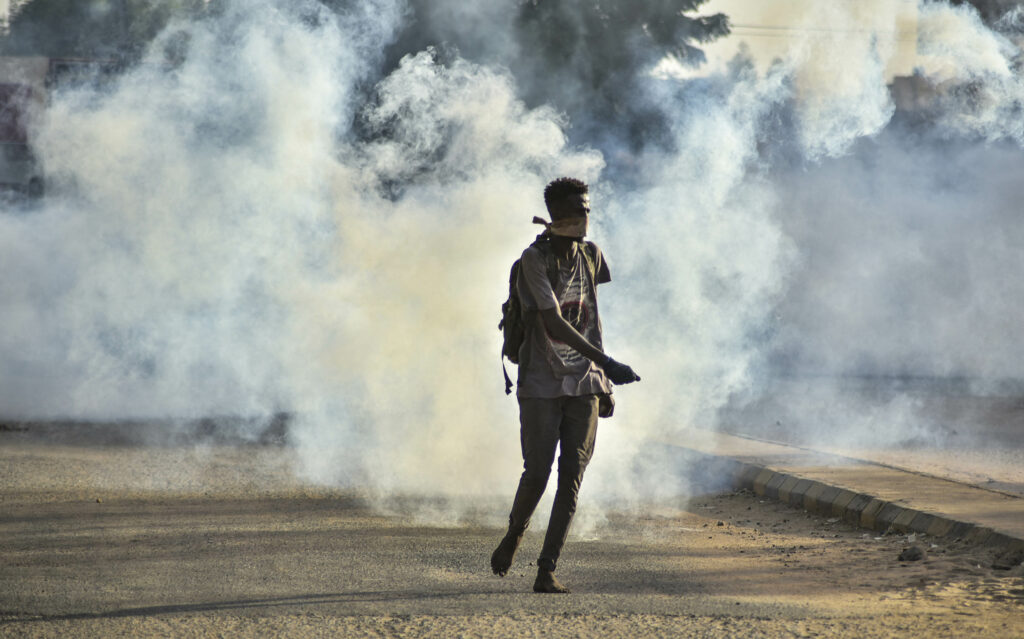Next month, the UN Security Council (UNSC) will reconvene to consider the implementation of the arms embargo it imposed on South Sudan’s territory in 2018, which expires on 31 May 2023. Photo: Supplied. Photo: AFP
Khartoum’s protesters will not yield. “We will continue to protest, even when they fire tear gas at us; even if they shoot us,” shouts Hind Abdelrahman*, a young anti-coup demonstrator on the streets of Khartoum during an anti-coup protest this month.
“And we will do it alone if no one wants to help us.” Her determined stance reflects the youth who crowd the streets of Khartoum and its sister cities, Omdurman and Bahri. Rallies calling for a return to full civilian rule have taken place across the country since the army seized power from the transitional authority on 25 October. Military authorities, led by General Abdel Fattah al-Burhan, attempted to appease the public and international community by reinstating the former prime minister and agreeing on 21 November to seek a consensus on resolving the country’s constitutional and political crisis.
The international community clearly bought the deal — Sudan’s streets did not. Opposition parties read the room and realised backing Prime Minister Abdalla Hamdok at this stage would be political suicide. Without support, Hamdok resigned last week and now the main opposition to the military coup leaders remains the country’s indefatigable protesters. “We are used to the tear gas,” protester Mohammed Yusuf told The Continent. “We’ve learnt to throw it right back.”
Out of touch
If the military and political elite thought they had understood the will of the people, they miscalculated. Instead of losing steam, pro-democracy demonstrations are gathering pace. A protest on 25 November took place in 23 locations across the country. Synchronised protests on 25 December took place in 30 different locations, including former war zones. These days, there are at least three protests per week in the capital, sometimes more.
Last Monday, Sudanese with dreadlocks protested the targeting of their Rastafarian community by the security forces. “They are harassed a lot,” said protester Cammon Ahmed, whose long dreads reach his waist. “Security routinely cut off our hair, with frequent beatings.”
Three Rastas have been killed in the anti-coup protests since the military takeover, he said. Sometimes using live bullets, security forces continue to target the protesters. These forces have killed at least 62 people since the anti-coup protests began. Two demonstrators were killed during Sunday’s demonstration, according to Sudan’s Central Doctor’s Committee.
“They are hoping for a war of attrition,” says Cameron Hudson, senior fellow at the think-tank the Atlantic Council. “By killing one or two protesters, the military is sending a deadly message to try to wear the protest movement down — but not so many, so as to avoid international condemnation.”
The protests in Khartoum in December were accompanied by demonstrations in the capital’s sister cities Omdurman and Bahri. The bloody crackdown on 3 June 2019, when security forces killed more than 100 protesters during a sit-in protest in front of the army headquarters, is still painfully present in the minds of the public.
No direction
But although the protests appear perennial, any potential political solution remains stuck in limbo, and Ahmed fears the protest movement could lose steam if no clear, unified political vision emerges.
“There is a lack of an agreed vision for the future, and this may lead to a loss of hope for change in the short term for citizens, especially with the difficult conditions people are living through,” he said.
 A Sudanese youth walks barefoot amidst tear gas fired by security forces in the capital Khartoum, on October 27, 2021, during ongoing demonstrations against a military takeover that has sparked widespread international condemnation. (Photo by AFP)
A Sudanese youth walks barefoot amidst tear gas fired by security forces in the capital Khartoum, on October 27, 2021, during ongoing demonstrations against a military takeover that has sparked widespread international condemnation. (Photo by AFP)
In early January, the military government sharply increased the price of electricity in the country, severely affecting factories and agricultural production. “The ruling authority resorted to increasing electricity prices since Sudan lost $4-billion this year from financial pledges from countries and international institutions that were suspended after the 25 October coup,” said trade union leader Osama alTayeb.
This has led factories to raise their prices by between 30% and 50%. Many protesters have lost faith in both Sudan’s political class and the international community. The military generals continue to rely on influential regional players in the Arabian Gulf — particularly Saudi Arabia and the United Arab Emirates — to support their leadership by offering weapons, political support and financial flows through purchases of gold.
Other international actors who claim to support the protest movement have shared mixed messages. The UN and other Western countries backed the 21 November agreement between the former prime minister and the military, for instance; a weak deal the public immediately saw would be ignored, entrenching the military’s de facto rule.
That is one of the reasons why protest groups rejected the recent UN-backed offer to host political negotiations. The Sudanese Professionals Association, leaders in the December 2019 revolution that toppled Bashir, has flatly refused to participate, sticking to its message for the coup leaders: “No negotiations, no compromise.”
“I do not know what the future will be like,” admits protester Mohammed. “But we all know what future we don’t want — that is why we’re here.”
This article was first published in The Continent, the award-winning pan-African newspaper designed to be read and shared on WhatsApp. Download your free copy here.